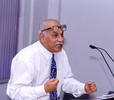Mahatma Gandhi's Role in the Freedom Struggle of India
by Dr. J.V. Naik

My comments
My class notes
Summary from the Program
Mahatma Gandhi held no official position, power or wealth or any kind of special distinction. Yet there are few individuals, who like Gandhi, have had such a profound influence, not only in their own country, but outside it as well.
Gandhi was in no sense an academic. He was a widely read man. He wrote on every conceivable subject and his works run into several volumes. Yet he was not built on 'academic writings.' He was an individual who though an idealist, had a firm grasp of reality and understood the real essence of India. He recognized as few have done, the real strength of his countrymen.
When one reviews Gandhi's role in the freedom struggle of India, one realises that his greatest contribution was his practice of non-violent revolution and his use of satyagraha to oppose oppression. He used 'non-cooperation' to awaken the Indian masses to a sense of dignity and power and it became a powerful tool with which to fight the might of a colonial power. By openly and peacefully defying the British might, by instilling fearlessness in the minds of the Indians, he knocked off the main pillar of imperialism.
To Gandhi, the means were as important as the ends. He stood for open, value-based politics and the unique means of satyagraha and ahimsa that he used, seem to be of even greater importance to us now in this new millenium.
My Notes
Gandhi (1869-1948) - Dr. J. V. Naik - "Spokesman of the conscience of all mankind" - Gandhi the father of Indian Independence - his personal interest was to "see God face to face" - he said "to me, God is truth and love" - public aim - peaceful end to British Raj - he wanted social transformation of India to make her worthy of her freedom - "Humanize, Equalize, Spiritualize" - Spiritualize = development of self - total emancipation of man, worldwide - according to Gandhi there were seven social sins: - politics without principles - commerce without morality - wealth without work - education without character - science without humanity - pleasure without conscience - worship without sacrifice - Gandhi practiced what he preached - truth and non-violence his tools - Jan. 13, 1948, assassinated - born 2 Oct 1869 - not a brilliant academic career - he's written on almost every subject known to man - studied law in Britain, became magistrate - went to South Africa, a turning point in his life because of apartheid - he stayed there 20 years - he was thrown out of a first class train compartment there for skin colour - he decided to break down apartheid - with non-violence - got himself imprisoned in S.A. (for passive resistance?) - read Tolstoy, wrote to Tolstoy, they became life-long friends - he did have detractors, world-wide and in India - orthodox Hindus hated his ideas about eliminating the caste system - 1915 S.A. to India - acted as recruiter for the British war effort - after the war, he took a dislike to the Raj, who were commiting atrocities (to instill fear) - cannot fight evil with evil, use good - no terrorism, just ahimsa - non-violence - means should be as pure as the ends - no state interference with religion! It's a personal thing - Galbraith called India "a functional anarchy" - Gandhi wasn't against industrialization per se, but against the loss of jobs it implied